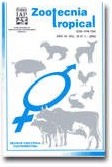
|
Zootecnia Tropical
Instituto Nacional de Investigaciones Agrícolas Venezuela
ISSN: 0798-7269
Vol. 28, No. 2, 2010, pp. 193-200
|
 Bioline Code: zt10021
Bioline Code: zt10021
Full paper language: English
Document type: Research Article
Document available free of charge
|
|
|
Zootecnia Tropical, Vol. 28, No. 2, 2010, pp. 193-200
| en |
Influence of hormonal implant failure on feedlot performance of fattening bulls
Cruz, Rubén Barajas; Pacheco, Billy Josue Cervantes; Rubio, Javier Alonso Romo; Barranco, Felipe Juárez & Ortega, Jorge Aguirre
Abstract
Ninety four Brahman crossed bull calves (335 ± 4,74 kg) were used with the objective of determinate the effect
of hormonal implant failure on growth performance response of fattening bulls in the Northwest of Mexico. In a
complete randomized block design, bulls were weighed and re-implanted in left ear with 120 mg of trenbolone
acetate and 24 mg of estradiol, placed in 12 ground pens and feeding a finishing diet. After 73 d they were
sacrificed, ear removed and implant condition was evaluated. The criteria were: a) Absorbable implants (normal,
broke or stocked); and b) Not absorbable implants (encapsulated, abscessed, or not found). Implant failure was (P
< 0,01) was 32,98%. Body weight gain diminished (P < 0,01) 12% by implant failure (101,89 vs. 90,94 kg), and
average daily gain decreased (P = 0,02) 10,4% (1,39 vs. 1,26 kg/d). Implant failure tended to decrease (P = 0,08)
2% carcass weight (258,4 vs. 253,3 kg) and 5% marbling grade (P = 0,06). Carcass dressing and kidney pelvic
and heart-fat were not affected (P > 0,48). It is concluded, that during hot and raining season implant failure is
higher than 30%, and diminish weight gain and carcass weight of finishing bulls.
Keywords
bovines, feedlot performance, hormonal implant.
|
| |
| es |
Influencia de la falla del implante hormonal en la respuesta productiva de toretes en ceba
Cruz, Rubén Barajas; Pacheco, Billy Josue Cervantes; Rubio, Javier Alonso Romo; Barranco, Felipe Juárez & Ortega, Jorge Aguirre
Resumen
Con el objetivo de determinar la influencia de la falla del implante hormonal en la respuesta productiva de toretes
en ceba en el Noroeste de México, fueron seleccionados 94 toretes encastados de Cebú (335 ± 4,74 kg). En un
diseño de bloques completos al azar, los toretes, fueron pesados y reimplantados en la oreja izquierda con 120 mg
de acetato de trenbolona y 24 mg de estradiol, alojados en 12 corrales y alimentados con una dieta de finalización.
Después de 73 días se sacrificaron y las orejas izquierdas fueron removidas para evaluarse la condición del
implante. Los criterios fueron: a) Implantes absorbibles (normales, quebrados y amontonados); y b) Implantes
no absorbibles (abscesados, encapsulados y no encontrados). La falla de implante (P < 0,01), fue del 32,98 %.
La ganancia de peso disminuyó (P < 0,01), en 12 % por la falla del implante (101,89 vs. 90,94 kg), y la ganancia
diaria de peso decreció (P = 0,02), en 10,4 % (1,39 vs. 1,26 kg/día). La falla del implante tendió a disminuir (P =
0.08), en 2% el peso de la canal (258,4 vs. 253,3 kg), y en 5 % (P = 0,06), el grado de marmoleo. El rendimiento
en canal y grasa interna no fueron afectados (P > 0,48). Se concluye que la ineficiencia del implante durante la
estación cálida y lluviosa es superior al 30%, reduciendo la ganancia de peso y el peso de la canal de los toretes
en ceba.
Palabras-clave
bovinos, desempeño en corral, implante hormonal.
|
| |
© Copyright 2010 - Zootecnia Tropical
Alternative site location: http://www.sian.inia.gob.ve/repositorio/revistas_ci/ZootecniaTropical/ztindice.htm
|
|
